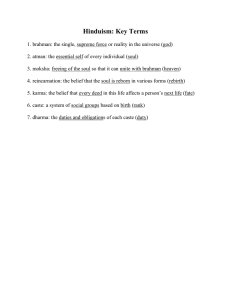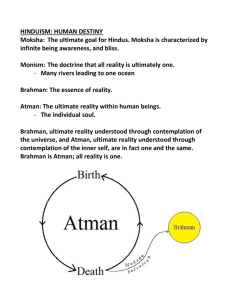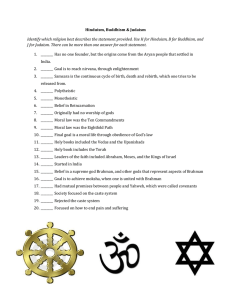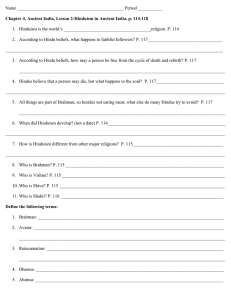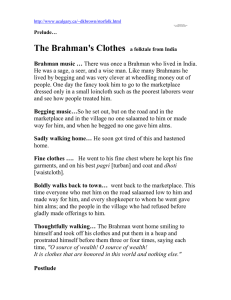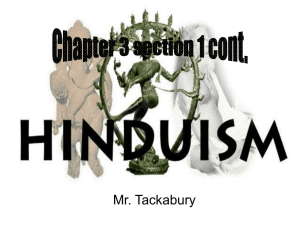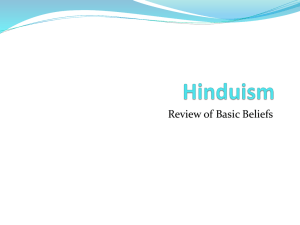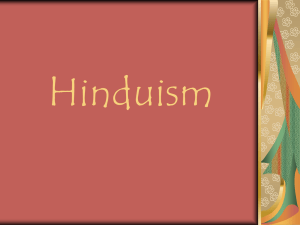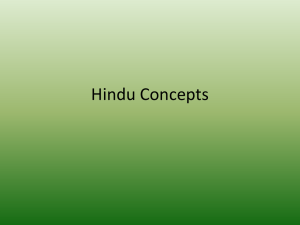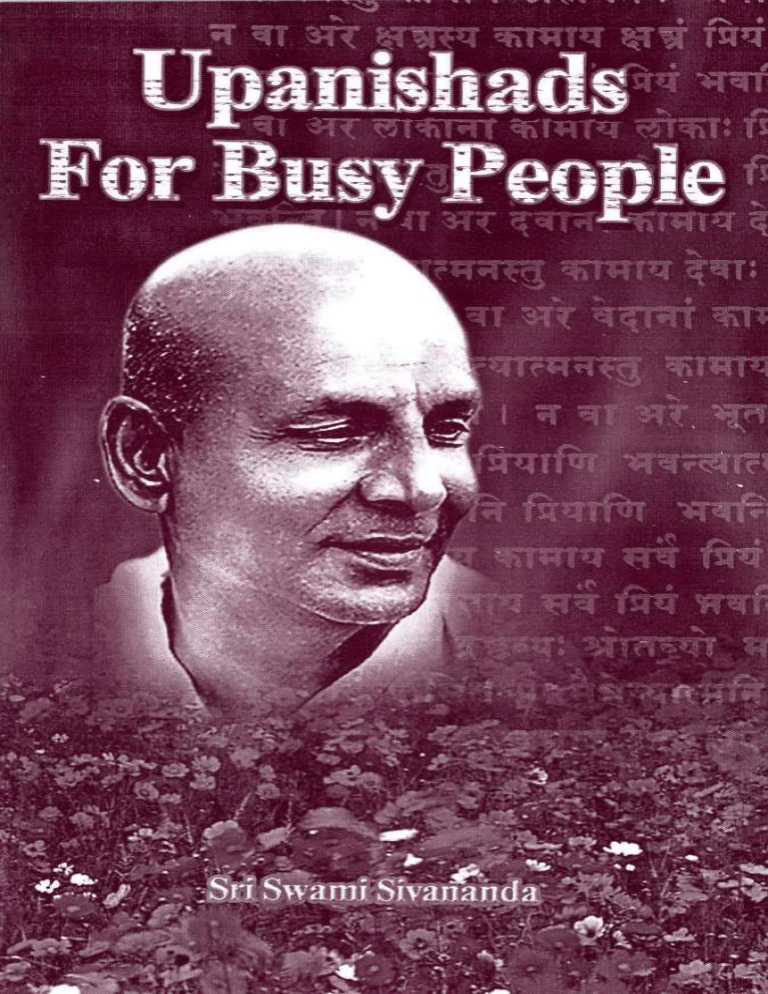
UPANISHADS
FOR BUSY PEOPLE
UPAIIISHADS
r.OR BUSY PEOPLE
Sri Swami Sivananda
published by
THE DIVINE LIFE SOCIETY
P.O. SHIvaNANDANAG AR-249 192
Distt. Iehri-Garhwal, Uttarakhand, Himalayas, lndia
www. sivanandaonline.org
1947
First Edition:
2008
Second Edition:
Third Edition: 2011
[ 500 Copies ]
@The Divine Life Trust SocietY
tsBN 81-7052-236-6
ESg1
PRICE: Rs.30/-
Published by SwamiVimalananda for
The Divine Life Society, Shivanandanagar, and
printed by him at the Yoga-Vedanta Forest Academy
Press, P.O. Shivanandanagar, Distt. Tehri-Garhwal,
Uttarakhand, HimalaYas, lndia
www. sivanandaonl ine.org
corvrE vrs
Santi-Patha.
11
lsavasyopanishad
l.Jnana-Nishtha
2.Karma-Nishtha.
..M
... ..14
3.TheAll-compassingBrahman. . . . .
4. Nature of a sage
..
5.PrayerofaDyingman.
....
14
15
15
Kenopanishad
1. The lnscrutable
Being
2. The Greatness of
. . 16
Self-Knowledge. . . . 1g
Kathopanishad
1. Futility of Earthly
pleasure
2. The Glory of Wisdom of the Self
3.Atmanlslmmortal
.
. . . . 19
. . . 19
. . . .21
. . . . 22
That. .
S.TheRazorPathofJnana ....22
6. Sense-knowledge ls Nothing
. . 23
T.ThelndivisibleBrahman ......24
8. The Supreme State.
. . . 25
4. The conditions of Knowing
Prasnopanishad
creatures.
2.Stateofliberation.
1. Sun, the life of
. . 26
.....26
Brahman . . ' ' 27
Soul . . . ' ' 28
3. The All-inclusiveness of
4. The State of Becoming the
MundakoPanishad
1. The Greatness of BrahmavidYa
30
2. The Worthlessness of Selfish-Karma
31
3. Tapas and Guru-Bhakti.
31
4. The Origin of all things
5. Brahman, the Target of Meditation
6. Know Thyself .
7. Everything is Brahman .
8. Purity Extolled
9. Force of Desire.
32
33
33
34
34
35
36
l0.StateofMoksha
MandukYoPanishad
Brahman
State of Being
Fourth
2. The
1. All This ls
.
... '
..'
...'
38
38
TaittiriYoPanishad
. . . .40
2.MeditationonVedicKnowledge . . . . .41
. . . .41
3.EthicalTeachings
. . ' 41
4. Knowledge of Brahman
l.OpeningPraYers.
Brahman
Knowledge
5. lmmanenceof
6. The Rapture of
AitareYoPanishad
1. Everything ls Only the
2. AllThis ls Brahman
Atman
OnlY
.... ' 42
. . ' 43
. . 45
. . . ' 45
Chhandogyopanishad
1. The Meditation on Udgitha-Omkara . . 47
2.Sandilya-Vidya
.. . . .47
3.MysticDeclarations
.. . .48
4. The Sacrifice of the Knower
. 49
5. The Paradox of Creation
. . . . 49
6. The Necessity for a Guru
. . . 50
T.TheSupremelnstruction ....51
S.NeedforUnderstanding
.... 51
9.Bhuma-Vidya.
.... 51
10. The Seer's Health and Purity.
. . . . . 52
11. Desires Should Be renounced .
. . . 53
12. Know the Atman
. 54
Bri hadaranyakopan ishad
1. A Prayer of the Devotee.
56
2. The Self ls the Dearest, the Self ls the Absolute 56
3. The Death of the Jnani
58
4. How to Know the Secret Atman
59
5. The Ocean of the Absolute
62
6. Words Are Useless
62
7. The Atman and lts Knower.
63
8. The lnfinite Brahman
64
9. Ethics
64
Svetasvataropanishad
1. Aspirants' Doubts
2. Divine Knowledge ls everything
..
.
65
65
Purusha . . 66
.....67
4.Thelmmanenceof God
. . 69
5. The Prayer of the Mumukshu
. . . 69
6. Knowledge ls lndispensable
..70
7.Guru-Bhakti .
3. The Nature of the Supreme
8
UPANISHADS
FOR BUSY PEOPLE
?nR-erer:
$ vi *
fra, vi qour, r vi * tr{trdrnr vi q
FfrgdF,Tft: r vi*Fd6grr'-fiq: t;rfrEErm I rqril
erfrt Hiq ysei ililrftt dr+q yqqr dil
qREnfr
xf qRerfr
qM
| ilqmqg I
qrqt
il{rfiRrdg sr+g
qI {fiRq u s: vnR.:
rnR': vnR: I I I
(E6urqq{qif.rffis{)
I
I
Fei
I
d" qE ;rrq{g I E6
s:
I
*
U{S I v6 d{ err{rqt
TrqsfrdrqrmfrMrr
VnR' VnR, WrR: n? n
I
(EEUrTdFq
Edqftr{)
$1 ryuqcrteg ftasq: t u*rxilsqEtrrflEql rT H tsmr quhgt sr€trs
kqRUil Wnrqr vrfri t Murqr ts6, t
qgrf,qn o,qhqi qF AT{q,t El-ilur: ui.silsfu
ierqr ftBo, I tri + rfrrrqu sY" vnR, vnR:
vnR, I ? t r (wsrdq sqRrqdenifrffiqd
I
11
12
UPANISHADS FORBUSY PEOPLE
$
srt Eers tft-{r I frftt: Y* FRfrq
us*qM qrffi{ H[dqRt qFdur ir+*sql
g+Er er[frsf,erd: r Eft fosr*{Er{ffi{qtt $1
t
*ffi: VnR, VnR: llYll
(rflTmgqfrsqawatrmrq.)
qftr<: {utfoi qnlqltg5<ti {uiw
e;. vnR: vnR:
{uiqrffi rytffilr
s:
(gmcrgdE{flqrffirE)
vnR:n\ll
{Eb silrql q{Erft qr{'sustg: rilat*
qaFGsrfrr q uqtftrl Ed rffiwi qre ril
ii
ftug;qf qrqrru
src I ilqrcqfr ffi q sqftr€ qqH rrfr vg t i
uftvqll $i YnRr YnR,,vnR':
llQ
ll
(vrqaqe*qRvq)
rri t
sftG-ilqr ertGnr*dqlu r*<eq oTruft€q:
qrffiiqqrgiqftlqrftlwei
e%
qr{A r{fu vfrBilrl
qrfu
r gf
t
qRlqrft I ilqrrrg I rrmrtr+g I sf{g qrq | grqg
qffir(l sltrgqmTtqll
S%
vnR: vnR', vnR:
I
le
I
I (x-r+qtdffir{)
SHANTI PATH
d"
rrq
ynR: nz
+
n
3Tfu{rrq rFT:1
l3
VnR: VnR,
(ruceemrftqQ
3Y"
€b srti q'fr&, Tgqrq t{r
wlrrerFrdsn, ; ftftifrq5ar .
Efr
$d
frr*qr, I ER
Erilg: I
qrj
sqmd*
gqr{r:Hd {: q11
rHrS eTMfr: HR +
q E-+
Ttsfu{trrgil s: vnR,,vrrR., $rR:
uB u
(etel*'+qu@
s: + Tilrui fuqeffi qd r d t *qis yRuift
rdt f r f*rs6qgkmlri ggg{ vnurqd xr}rr
d"vnR,: vnR' vnR. n?o tr (tmrrt'rftue
,SAYASYOPANISHAD
1. Jnana-Nishtha
Evn
qrsFrqrrd qR,a wrsi wr(
|
qI Ttt: qskq+q t I
By the Lord is all this enveloped whatever
moving thing there is in the changing world; with
that renounced, enjoy; covet not the wealth of any
Aq
F{*.{
gdqr
one. (1)
2. Karma'Nishtha
5d+a€ u,,qtftr ftr*A+.ua.rrrt:
I
\,?iHftqraffisRqqdftqlitt
Performing verily works in this world, one should
wish to live a hundred years. Thus it is right for thee and
not otherwise than this. Action will not bind that
man. (2)
3. The
All'comPassing Brahman
(ffi ilffi rf, raRlt
irqiEilET
Fds rg Fdsrs
EnEI?t:
II
It moves. lt moves not. lt is far. lt is near. lt is within
all. lt is outside all. (5)
14
ISAVASYOPANISHAD
15
4. The Nature of a Sage
qqrrdmr@r
qdr$g qrrrr+ rril q P*ggqft
;1
He, who, on all beings, looks as his very Self, and
beings-he does not shrink away from
anything. (6)
on the Self as all
qfu{rqiftr@:t
ir*Eil*E: $': Vfrq'g*-sqgwVum, tt
ln whom the Knower, all beings have become just
the Self, then what delusion, what sorrow is there for
him who perceives, Oneness everywhere? (7)
5. Prayer of a dying man
Etorr}{qr}urtrssrfrRrigqq
ffii {r*qrflU Essdqtq gr}
I
tr
With a golden vessel is the Reality's face covered
over; that do thou, O Pushan! Uncover for one whose
law (Dharma) is to see the Reatity. (15)
KENOPANISHAD
1.
The lnscrutable Being
art*s stsi T{q} rn T{r+ 6 erci rT ir vprs
vu*rQJtrs$ftr5q *t: *i{rsrfr*.r<5dr
rrqR'tt
That which is the ear of the ear, the mind of the
mind, the speech of speech, the Prana of Pranas (the
Breath of the breath), the eye of the eye; escaping beyond these, the wise, on departing from this world, become lmmortal. (1.2)
;T
irr qQiltasft a qrnr.sfr +
ffi
rn q m
q
dGfrdrqrn
erBftlrrq& r Eft
ggqdqi i ;rw<qrqfR
tt
There the eye goes not; speech goes not, northe
mind. We know not, we understand not how one would
teach lt. lndeed, lt is other than the known, and moreover is above the unknown. Thus we have heard from
the ancients, who to us have explained lt. (1. 3)
+{ qFFg.{t
atqraeiF&+i qftHgqmt
6
KENOPANISHAD
l7
That which is unexpressed with speech, that with
which speech is expressed, that, verily, know as Brahman, not this that people worship here. (1. 4)
?5*FR1
ateilil
;T q3il }aq{+ T{rI
FiFdfrteqRqgqmil rr
I
That which one thinks not with thought, and that
with which they say thought is thought; that, verily, know
as Brahman; not this that people worship here. (1. 5)
qqgqrTrrwrfrtqqSurqftr
ate ils Ei Fcfr iq qfrEgqrgil
rr
That which one sees not with sight, that with which
one sees sights, that, verily, know as Brahman, not this
that people worship here. (1. 6)
116rr+g+tfri qaffi*eq
Eil TF}Edlq
r
iqatftieqrr
I think not 'l know well'; yet I do not know ,l do not
know'; he among us who knows lt, knows lt; yet he does
not know'l know not.'(ll. 2)
qsrqii ils qf
rTd
qpa*qq:
s{F{driM'ffiqnnrq
t
rr
It is known by him by whom lt is not known; he by
whom lt is known, knows lt not; lt is not understood by
those who understand lt; lt is understood by those who
do not understand lt. (ll. 3)
18
UPANISHADS FOR BUSY PEOPLE
2. The Greatness of Self-knowledge
{6 ffifrqE FsqR;T +Rrr+ffi
ffi:
I cgg
Erqfr
tt
cltgfrfus *n:
ffiorq[dr
lf one would know (lt) here, then there is the True
end (of all aspirations). lf one would not know (lt) here,
then great is the loss (for him). Knowing (lt) in every single being, the wise, on departing from this world, become lmmortal. (11.5)
KATHOPANISHAD
1. Futility of Earthly Pleasure
shnqTrdf-s
oTfr
Fd dPdilqiq+{
q{qfrtq:
r*e
qrarwq Torft}
t
rr
Ephemeral things! That which is mortal's, even the
vigour of all the senses, they wear away. Even a whole
life is indeed very slight. Thine be the vehicles, thine the
dance and song. (1.i.26)
r Fd+{ d{ufl* rgd Hqrqt fusrqrw
AEr filM zrr+frffi Fd q{q t qruftq: q
r
Fil
Not with wealth is a man to be satisfied; shall we
take wealth if we have seen thee (the lmmortal)? Shall
we live so long as thou shalt rule? This in truth, is the
boon to be chosen by me. (1.i.27)
2. Glory of Wisdom of the Self
Brrr"fr
rd:
ffitr
s{gt{ffi ss}Trrr{gwift rftr:
ur$,t{ft ffisqla B }d
The good is one thing and the pleasant is another
thing. Both these, of different aim, bind a person. Of
19
20
UPANISHADS FOR BUSY PEOPLE
these two, well is it for him who takes the good; he fails
of his aim who choose the pleasant. (l.ii.1)
*qs iqs
rgqffi
H fr fitsFTH
qhgqr{qtufttrr
{qft€ frGrrPn tftt:
H
I
q-+
Both the good and the pleasant come to a man.
Going all around the two, the wise man discriminates.
The wise o.ne choose the good, indeed, rather than the
pleasant; the stupid man, for getting and keeping
(Yoga-Kshema), chooses the pleasant. (l.ii.2)
erffi
Ttqrqr' H{i *tt:
trdrqqmr: | (ffiqrurt: qfisft'qn
w&aq
ftq{r+rrTelratt: il
Those living in the midst of ignorance, self-wise,
thinking themselves learned, running here and there,
go around deluded, like the blind men led by one who is
himself blind. (l.ii.5)
q {iq{rq: vftrffi qrci v{rffii Cffidt{
{r{
t
sni ffi ;ilfr q{ fr rTrft g+: gqffi
I
It
Death (passing on) (the way to the hereafter), is
not clear to him who is childish, headless, deluded with
the delusion of wealth. Thinking 'This is the world!
There is no other!'again and again he comes under my
(Death's) control. (l.ii.6)
KATHOPANISHAD
21
T{rrnqtfr {Sfum ;T FTa"r: tu*dsft Ttm ?i
a F*g: I en*rd qtu., Ewilss mcfiazil f,mr
g;vrogRu:
rr
He who by many is not obtainable even to hear of;
he whom many, even when hearing, do not know; Wonderful is the declarer, proficient is the obtalner of Him!
Wonderful is the knower, proficiently taught! (l.ii.7)
t
g+d rldqEsftrs u.6rki .r&s gilq'ql
eTsrrrirdrnflrrr+{
ti rm sftfr Effi
qaft
rI
Him whom it is hard to see, entered into the hidden, unfathomable and concealed, set in the secret
place (of the heart), dwelling in the depth, the primeval-By considering Him as God, through the
Yoga-study (Meditation) of what pertains to the Self, the
wise man leaves joy and sorrow behind. (1.ii.12)
rr{
+qr rsqqrqqR, dqr:
qM
ft
Fqtftr q ?rrER|
rdq{ urft 61oE{qturrffift+n(
rr
The state which all the Vedas declare, which alt
austerities proclaim, desiring which men live the life of
Brahmacharya, that state I briefly declare to thee-That
is oM! (l.ii.1s)
3. Atman
is lmmortal
rqrqilffi erMtrxniyl**eaeq;l5(
I
ffi fts: vrnr+dsri g{ruila Eqt Eqqr+ yr&
II
22
UPANISHADS FORBUSY PEOPLE
The wise one (Atman) is not born, nor dies; this
one has not come from anywhere, has not become anyone. Unborn, constant, eternal, primeval, this one is not
slain when the body is slain. (1.ii.18)
4. Conditions of Knowing That
:Tr{[IneII
v{qtq
HIEfr
q**q ggn+{Hrqw€q
e terqr r qg{r gt{l
sTrdqr
ft?gitri"wq
t
t
This soul (Atman) is not to be attained by instruction nor by intellect, not by much learning. He is to be attained only by one whom 'He chooses, to such a one
that Atman reveals His True Nature.'(1.ii.23)
{rGrrd gsfiKrersnd
qruTqrfrffi;
Twn;ilqwdffiy-6ffiamgr(
I
tt
Not he who has not ceased from bad conduct, not
he who is not tranquil, not he who is not composed (in
mind), not he who is not of peaceful mind, can attain
Him by intelligence. (1.ii.24)
5. The Razor-Path of Jnana.
sRrrfl quiT vrq qrrGrfrtrfrl grw qrt
ftRrdr grs{r grf uerwo,+m qfi t I
Arise!Awake!Obtaining men of wisdom, know (lt).
A sharpened edge of a tazo\ hard to tread, a difficult
path is this-sages declare! (l.iii.14)
KATHOPANISHAD
ffii
ilensGi frsqlFrqgr{r(l
srrrilfii rrt?: qt gti fr{rq il{qgqrisgq+
rI
That which is soundless, touchless, formless, imperishable, tasteless, constant, odourless, without beginning, without end, higher than the high, stable, by
knowing That, one is liberated from the mouth of death.
(r.iii.15)
6. Sense-Knowledge is Nothing
wrfu qrft
cqqut(rgct}\t((*t l(t{(lq q{qft
qrfrrri[r{
yffrriqFdffirqFE5,fffrr:
qql{[il€kEr{ ll
|
The self-existent (Creator) pierced the openings of
the senses outward, therefore one looks outward, not
within himself. A certain wise man (only) while seeking
lmmortality, introspectively beholds the soul (Atman)
face to face. (ll.i.1)
i5,rmr{qfr qrfird qddR F{frds
lrtvrq I oTsr ?ftr srEffii f{frlHr gangiGe a
yrelr+ il
Ir{rEr:
The childish run after external pleasures, they
walk into the net of wide-spread death (Samsara). But
the wise, knowing lmmortality, seek not the Stable
(Brahman) among things which are impermanent here.
(il.i.2)
UPANISHADS FOR BUSY PEOPLE
24
7. The lndivisible Brahman
qtfu ilqIIr rqgr rcRet
gd:
u gqlrrcfrft q y6 Tr+q qsqfr
It
Whatever is here, that is there, Whatever is there,
that is here. He obtains death after death who seems to
see a difference here. (11.i.10)
lr+*+qqrrai+6TrnRfrT rI
: IT
Ei
il+{ qsqft
rr.Efr q
tr
=-E
By the mind, verily, is this to be attained; there is
nothing diverse here. He goes from death to death who
seems to see a difference here. (11.i.11)
+ffi-
ETT:
fuEilrnr(t@
sTksr xd grq
ri-drxffiil
tr
The Swan (the Sun) in the clear (heaven), the
Vasu in the atmosphere, the priest in the altar, the guest
in the house, in man, in broad space, in the Real, in the
sky, born in water, born in the cattle, born in the right,
born in rock, is the Truth, the Great! (ll.ii.2)
s{ftdH g*i yGr* F.i Ei yffi
girrkTer
qrnr I
Eis,iyffieRatt
As the one fire has entered the world and becomes corresponding in form to every form, so the One
Antar-Atman of allthings is corresponding in form to every form, and yet is outside (all these). (ll.ii.9)
KATHOPANISHAD
!S
qtn
25
rffio,q agd ffi qrgffit:r
gdrkren
qffiefomg:daErru:
u
As the sun, the eye of the whole world, is not sullied by the external faults of the eyes, so the One
Antar-Atman of all things is not sullied by the evils of the
world, being externalto it. (ll.ii.11)
8. The Supreme State
it:r qd r{rfr T qqilR+ +qr F{gil s{rR
s.ils{qfr : I d+E rnHEE nfr u{ rsr rrrfi rdfrq
;T
frlnfrlt
The sun does not shine there, nor the moon and
the stars. These lightnings do not shine, what to speak
of this earthly fire! After Him, as He shines, does everything else shine. This whole world is illumihed by His
light! (ll.ii.15)
Tqrq{rEft5+ilr;tfiIFRTT116 |
gfua r fr+sft irrrra: wqi rrftq
rr
When the five sense-knowledge cease together
with the mind, and the intellect does not move, that,
they say, is the Highest State. (ll.iii.10)
TEr v+ ywre qT qr tr€q
srE Td.sgd r*rerr EGr
fi
vrgt
fgrcr:
I
II
When all the desires that are lodged in the heart
are liberated, then a mortalbecomes lmmortal!Therein
he attains Brahman! (ll.iii.14)
PRASTVOPANISHAD
1. Sun,
the Life of Creatures
ftr{6d' Eftri qrilaqi wrqui dfrir
drirq I E6F(fr: Yl?tfi Tfur;t'
rwmr5raqq{: ll
sTut:
Him, who has allforms, the golden one, all-knowing, the final goal, the only light, heat-giving the thousand-rayed, the hundredfold revolving, yonder sun
rises as the life of all creatures. (1.8)
2. State of Liberation
sTeHur ilRn
Eildur
I
9rq{r
qne yTulrflg.{trdt-<
f&qfttqatqv#o:
tl
They who seek the Atman by austerity, chastity,
faith, and knowledge-they by the Northern Route win
the sun. That, verily, is the support of life-breaths' That
is the lmmortal, the fearless. That is the final Goal.
From that they do not return. That is the stopping of rebirth. (1.10)
26
PRASNOPANISHAD
rdttr.renrfuxi qrR t
27
ftg+S?qrEr+r
tqr}AqFsFffinqidfrilil{{+SHi{
sftrBtrq
tr
They, indeed, possess that Abode of Brahman,
who posses austerity, chastity, and in whom the truth is
established. (1.15)
tqrqfr
ifttr
ffi
ildFH r +g ftrgrfi
;T
rnqr
To them belongs the yon unbtemished Abode of
Brahman, in whom there is no crookedness and falsehood, nor tricks! (1.16)
3. The All-inclusiveness of Brahman
frmsfrwqr*q
{$ qr rffi qqq[}q
anII:
\S yD'* rfth: FffiilrTi q r(
I
n
As fire He warms. He is the Sun. He is the bountiful
rain. He is the wind. He is the earth, matter, God, Being,
and Non-being, and what is lmmortal! (1t.5)
v'urr*i e:il
E{
rntE grrr1te{€ gfts
ftCA rrerftrBrql
yti q GF}R q Efr
II
This whole world is in the control of Life (Prana),
even what is established in the third heaven! As a
rnother her son, do thou protect us! Grant us prosperity
and wisdom! (11.13)
28
UPANISTIADS FOR BUSY PEOPLE
4. The State of becoming the Soul
te: EA
qfunqr$rqhI Er{E
Esr{rr*ft ga g.dts{reftr{Euilftt inrftrrds
reXi XFr:gr, lag3r{fr Es qrEE q gii qtgii
sT*q
qqrui qr+grui q HqtrEt E{ qvlfr 14: qvqft
tt
There He experiences Greatness; whatever object has been seen, he sees again; whatever has been
heard he hears again. That which has been severally
experienced in different places and regions, he severally experiences again and again. Both what has been
seen and what has not been seen, both what has been
heard and what has not been heard, both what has
been experienced and what has not been experienced,
both the real and the unreal, he sees all. He sees lt,
himself being the All. (1V.5)
q qen
fu
qq'ift qr*tqi {sfrE+
I
F E ere-{ rn srrf,ft risfrstlt
As birds resort to a tree for a resting place, even so
it is to the Supreme Soul (Atman) that everything here
resorts. (1V.7)
\rq
fr
Esr
{iur
eildr Erflr
wfuilr
rtrr+qr
u-{t ftrf,rtriqr gurr: H Qs& srriqfr risfts}
II
Truly, this seer, toucher, hearer, smeller, taster,
thinker, knower, doer, the knowing self, the person-his
abode is in the Supreme lmperishable Atman. (1V.9)
PRASNOPANISHAD
wfqrq{tyMH*E+
ffiiggqaiffiq+g*qrn
rdt: qd Tqftu
He who recognizes this shadowless, bodiless,
colourless, pu.re lmperishable, arrives at the lmperish_
able ltself. He knowing the All, becomes the All.
1iV.f Oy
.
ffi
IrqtqEdqsr{qi+ftrr
P**rqrcsm-
With the syllable OM as the support, the knower
reaches That which is peaceful, Unaging immortal,
fearless, the Supreme! (V.7)
MUNDAKOPANISHAD
1. The Greatness
vfr+m:
f€rii
of Brahmavidya
qrpgl q;fr{ wrfr ftrf,rn Edfoi
Er+ftfrn
Sannaka asked, "What is That by knowing which
everything else becomes known?" (1.i.3)
rCut{qt AHffiir*Eftre
T{frffiTfirRI+{Fmqll
To him he said, "There are two knowledge to be
known-as indeed the knowers of Brahman are used to
say-the higher and the lower."
3Tq rRT
(1.i.4)
q{n 6qertqRrrrEq} ll
Of these, the higher is that whereby that lmperishable is attained. (1.i.5)
ffig:ail*ilenfrtqri
ftFi frS
ffi
gq$ ilea{i rq5d+H qfitqtqR
*tt: u
That which is invisible, ungraspable, without origin, without caste, without sight, without hearing, without hand, without foot, eternal, all-pervading,
omnipresent, exceedingly subtle; That is the lmperish-
3l
MUNDAKOPANISHAD
able, which the wise perceive as the Source of all beings. (1.i.6)
2.The Worthlessness of Selfish Karma
rffir tt ergr rf,Gqr ersreBiltrrrei tS q'{ t
qcA+ fuFr4q6 Wr !ilrTdi + gilffi qR
II
Unsafe boats, however, are these sacrificialforms,
the eighteen, in which is expressed the lower work. The
fools who approve that, (the works) as the really good,
go again and again to old age and death. (1.2.7)
qftd qrqrQ$ ffi
xqn:
;TIIFEI yi t g.s.lsfldri *ir t{ili qr fryrR'
5urd
q-errTr;TT
I
rr
Thinking that sacrifice and merit is the superior
thing, nothing better do they know-deluded! After enjoying in the top of heavenly bliss, won by good deeds,
they re-enter this world or even a lower. (1.ii.10)
3. Tapas and Guru-Bhakti
aq:rdt
q$ailur
urEnftrdi+
qqmqf qm:
I
t frrqr: y{rR ErdTTfi :
HSsfrErarqrf,r
tl
They who practise austerity and faith in the forest,
the peacefu!, the knowers, who live on alms, depart
passionless through the door of the sun, to where is that
lmmortal Person, the lmperishable Spirit! (1.ii.11)
UPANISTIADS FOR BUSY PEOPLE
32
qftqq
E{IRIE
ffi
it:
fr+qqrqrIT
5,ilrr
@:*ftrirsfrsttt
Having scrutinised the worlds that are built up by
actions, a Brahmana should arrive at indifference and
dispassion. That world that was not made is not won by
what is done. Forthe sake of this knowledge, let him go,
fuel in hand, to a spiritual preceptor who is learned in
the scriptures and established in Brahman. (1.ii.12)
ilC
rT f**rgqffiq
(q{
vrrnRilrql +{rer{ XfFi *e Eei
sflfusr{
v{rrfrfu{rq
*{rq (i Hsd
rl
Such a knowing Teacher, unto one who has approached properly, whose thought is tranquilised, who
has reached peace, teaches in its very truth that knowledge of Brahman, whereby one knows the lmperishable, the Person, the Truth! (1.ii.13)
4. The Origin of All Things
HtilffiFiqen@:rt6€wt:
ry{A
HFtn: rErqrffifrEr:
*rq
rrrifi:
vqrq*
T*+{rfrzrRil
This is the Truth. As from a well-blazing fire,
sparks by thousands issue forth of the same form, so
from the lmperishable, beings manifold are produced,
and thither also return once again. (ll.ii.1)
MUNDAKOPANISHAD
g€q qtq fr?i m,,{
ftki
Udrqi
afr
33
ra rrrrqq r qrd *q
pilffid F{ffi6 *Eq
I
I
He who knows That set in the secret place of the
heart, He here on earth, rents asunder the knot of ignorance. (11.i.10)
5. Brahman, the Target of Meditation
qefrTnqglRilsg
q
qffifr6r
dfu+g I atrEeT{ trfl rT srurwg
d|rroeid-{gaa}ep{dEqfrk rr
frtrdr
EIT TFT:
I
That which is blazing, which is subfler than the
subtle, on which the worlds are set, together with their
inhabitants-That is the lmperishable Brahman!That is
Life. That is speech and mind. That is the lmmortal.
That is to be penetrated. Penetrate it, myfriendl (ll.ii.2)
srgtfrc+qftsi Tdr€i vri qqmrFrfrRi rierfra t
srr{trq ilffirrt{ Arsr Hqei ilAtrrerr rilF{ frrk f f
Taking as a bow the great weapon of the
Upanishads, one should put upon it an arrow sharpened by meditation. Stretching it with a thought directed
to the essence of That, penetrate that lmperishable as
the mark, my friend! (ll.ii.3)
6. Know Thyself
at**
qr+er eTriqFrren
er* fuaengtrdq
+g :
I
UPANISHADS FOR BUSY PEOPLE
Him alone know as the one Soul. Dismiss all other
words. He is the bridge to lmmortality. (ll.ii.5)
onft+i
Ilqil
enrrE srriqr+
€R
q:
sRt{T ilrrct:
OM! Thus meditate upon the Soul! Success be to
you in crossing to the farther shore beyond darkness!
(il.ii.6)
ftrgt e(qlF*lRrr-n vdriYr€m:
qffi
qr€r 6qmT
afrq}
I
rrtr& tt
The knot of the heart is broken, all doubts are cut
off, and one's actions perish, when He is seen, who is
both the higher and the lower. (ll.ii.8)
7. Everything is Brahman
r&+flTi
orer$d
qsr({il qt*rurfrffiur
vqd E&&i ftufuq qfrq
g{€ilrq*il
?
t
tt
Brahman, indeed, is this lmmortal! Brahman is be-
fore, Brahman behind, to right and to left, stretched
forth below and above, Brahman, indeed, is allthis, the
great, this widest extent! (ll.ii.11)
8. Purity extolled
Ftr+q \ffit Trfi Fe{ r.en fuild
f+*n:
I
ElHt5',rrilElltrgst'qqaifrry
t
t
Truth alone conquers, not falsehood. By Truth is
laid out the path leading to the gods by which the sages
MUNDAKOPANISHAD
35
whose desire is satisfied ascend to where is the highest
Abode of Truth! (lll.i.6)
;T
tn
qgq'r TUil {rfr Eil=r rrdi+Fdq€r
u'CuTT
I Ems€rt{ F*g-trilwdq ii qvqt frwti
aTfif+mT:
ll
Not by sight is it grasped, not even by speech, not
by any other sense-organs, austerity, or work. By the
Peace attained through Knowledge, one's nature being
purified, in that way, however, by meditating, one does
behold Brahman which is without parts. (lll.i.8)
9. Force of Desire
ii ri tftfr r+sr ffirrrfr Fq{FEiug: 6.rrqt qig
qqil ais m,,rqiFilFTrqrtri Erd+{
u'lrn1 I ii ii
*i
qk*'rn: il
Whatever world a man of purified nature makes
clear in mind, and whatever desires he desires for himself; that world he wins, and those desires he fulfils.
Therefore he who is desirous of welfare should worship
the knower of the soul. (lll.i.10)
Eh'rlTret:
i5.rffi} sdftffi; H q-rqFlElfuA il:t ir*
Tqtrfirf,q q;-drcr{Rt{ s{
sffi
I
irrrn: I I
He who in fancy forms desires, because of his desires is born here and there. But of him whose desire is
satisfled, who is a perfected soul, alldesires even here
on earth vanish away! (lll.ii.2)
36
UPANISHADS FOR BUSY PEOPLE
10. State of Moksha
E-drfl+ firRrrn: ssrrdT:
Trdri *rda: srq efrrr gffilrrrn: rdiarffi ll
iTTETTT:
t
I
Attaining Him, the seers who are satisfied with
knowledge, who are perfected souls, free from passion,
tranquil,-attaining Him who is the universally omnipresent, those wise devout souls into the AII itself do
enter. (lll.ii.5)
rffi.nerrq: UE{lErT:
@qt:
t Erfriiltg wrffiT& wrTil: qfr5zqR *r{ tt
I
They who have realised the meaning of the
Vedanta-Knowledge, the sages, with natures purified
through the Yoga of renunciation, they in the abode of
Brahman in the end of time are all liberated beyond
death. (lll.ii.6)
rrin: iftrT: s5qfl sfrsr tdtg qd sftt{f,rg
u,,qifur t*rr+rrqg snffir Qsq+ rd qfrqffi
t
;
1
Gone are the fifteen parts according to their station, even all the sense-organs (are gone) in their corresponding divinities! One's actions and the self
consisting of intelligence, all become unified in the Supreme Imperishable! (l ll.ii.7)
rr6R rrEF6t Fd6rq
aer F{grxnssqftgffi: qrnqtguqgqfr@ tt
qqr rEr: Tq-qqr;il: ESisEi
t
MUNDAKOPANISHAD
37
As the flowing rivers in the ocean disappear, leaving name and form, so the wise man being liberated
from name and form, reaches the heavenly purusha,
who is Higher than the high. (lll.ii.8)
rT
+ E A iliqtri ;ril +( r&q srdft
;n€qrfrdrF{cgd rrdft
I ilrfr yhir rrft qrqri
ferrRn+fr5m}tsTd) srefr tt
He who knows that Supreme Brahman, verily becomes Brahman. ln his family no one ignorant of Brahman will arise. He crosses over sorrow. He crosses
over sin. Liberated from the knots of the heart, he becomes lmmortal. (lll.ii.9)
MANDUKYOPANISHAD
1.
Allthis is Brahman
oifrr+n(ffifuq.6 ildqqrqr+
rr*ffin Effiu,Tr gal qqqffit
Ta
irq+fiRoull
OM! This syllable is this all. lts further explanation
is: the past, the present, the future-everything is just
the word OM! And whatever is beyond the threefold that
too is just the word OM! (1)
Ed
.t-{
Tilr{rrrfir
ra ll
For truly, everything here is Brahman; this Atma is
Brahman. (2)
2. The Fourth State of Being
;na:5rfl'q qR6si +lr{fr:ss T vf,rfri T vf,
{rsrfll@@+fi rff ffi
Ttsq*T{rrivrmitrqq*iqgslrrq't
IT 3rriqrqfrilq:
I
Not inwardly conscious, not outwardly conscious,
not both-wise-conscious, not a consciousness-mass,
not conscious, not unconscious, unseen, with which
there can be no dealing, ungraspable, having no dis38
MANDUKYOPANISHAD
39
tinctive mark, non-thinkable that cannot be designated,
the essence of the assurance of which is the state of
oneness of the Self, the cessation of all phenomena,
peaceful, blessed, without a second-such is the fourth
(state). That is the Self (Atman). That shoutd be
known. (7)
qdd6T{ srri+q frranffi{rsscffqrT ll
Thus Om is the Self indeed. He who knows this,
with his self enters the Self. (12)
TAITTIRIYA UPANISHAD
1. Opening Prayer
e%
ftasq: I Edhdscq-
TdrffiET{ I q !fr ierrn {guilg I ergd{q t3emuil
ftr6r n qg{n{n
Trrqt yrfri +
{@l
uurfrvi qft frgqt
frBa,tTd+rfrqrqtt
ililur: ffisR
ierqr
He who is pre-eminent among the Vedic hymns,
who is of universal form, who has sprung into being
from immortality above the Vedic hymns-Let this lndra
deliver me with intelligence! O God! I would become
possessor of lmmortality! May my body be exceedingly
sweet! May I hear abundantly with my ears! Thou art
the sheath of Brahman with intelligence covered over!
Guard for me what I have heard. (1.4.1)
efrfrft
ril I sfrFmflq:@t eifrfr dr-ilur:
r[F.n6rs[rrt{qTfrft |rfrArrnGilfr II
Om is Brahman. Om is this All. Om! Says
a
Brahmana about to recite, 'may I get the sacred Brahman.' He does get the sacred Brahman. (1.8)
40
TAITTIRIYA
UPANIS}IAD
4I
2. Meditation on Vedic Knowledge
sr6
gq{q\ft-{r I ffftt: Eqi FRftq t
qrfuft{ EgaqRt Eftu
uffi
: nr+sqt g+ut
srEilsftrd: I Fft frvr*{qrgrqrq
rr
I am the mover of the tree! My fame is like a mountain's peak! Exaltedly pure, like the excellent nectar in
the sun, I am a shining treasure, Wise, immortal, indestructible! This is Trishanku's recitation on the Vedic
Knowledge. (1.10)
3. EthicalTeachings
vei
EG t
q{ qt I etTelrqr*tr
srr€[:
I
Speak the Truth. Practise virtue. Neglect not study
of the Vedas. (1.11.1)
erqqr
*rq
t sTrrqfls+qq I fgrqr tqq,
tlq t{fuqrtqqrr
r
E{r
One should give (in charity) with faith. One should
not give without faith. One should give in plenty. One
should give with modesty. One should give with sympathy. (1.11.3)
4. Knowledge of Brahman
rfufr
Til
I
* +E ftki
qrq I dtvnvfir I rrei Errwl<i
ytt Emr{ I +srdil Fqh
nf6rqi
i[,rqr{F6rgunffisifrr
42
UPANIS}IADS FOR BUSY PEOPLE
He who knows Brahman attains the Highest. As to
this, has been declared: He who knows Brahman as
Truth, Knowledge, lnfinity, set down in the secret place
(of the heart) and in the highest heaven, he obtains all
desires, together with the intelligent Brahman. (11.1)
Tdqrdft{d+ | eunqq4gtq6I
orrr< ilfluil fu{q r fcstft giilr€rtft
II
From where words turn back together with the
mind, not having reached, that Bliss of Brahman he
who knows, fears not from anything at all. (11.9.1)
srs*{€ srehr srqsdft*e+( t
eTR r&fr Atq I vtrii rfr F+gfift
I
It
One becomes non-existent himself if he thinks that
Brahman is non-existent. lf one knows that Brahman
exists, such a one people thereby know as existent
(Santa). (11.6.1)
5. lmmanence of Brahman
*surrqa rvgwirwritR tuafrsaqa, q
ilrgwrt Eq:gd{r{d qfri foal irqlq{l
ffi{{rq
qrft€iit q
r
I
il{lIvP{${I
I
rrqH€ilTTq I ft€+
ft6qi qft6ai u fusFi qF*tri q
I
Edis'TiqqR{ftat
He desired: 'May I become many.'Let me procreate myself.'He performed Tapas. Having performed
Tapas he created this whole world, whatever there is
TAITTIRIYA
UPANISIIAD
43
here. Having created it he entered into it. Having entered it, he become both the actual and the yon, both
.the deflned and the undefined, both the based and the
non-based, both the conscious and the unconscious,
both the real and the false, and all this that exists.
(il.6.1)
3rtr{r EEqr
wqrgffia
|
3ntr( | ild e rrFrr{il I irEriqri
ilsffiqlmIqnvft vtrqSi {d
r
r
t q: {d tsdrri rcqrrfr rrefrt q} tqrqrffi:
ylu{r( tqtq snEEr$ sTr;rd;TE[q
I
ln the beginning, verily, this was non-existent.
From that existence was produced. That made itself the
Atman. Therefore it is called the well-done (Sukrita).
Verily, what that well-done is-that verily is the essence
of Existence. For truly on getting the essence, one becomes blissful. For, who indeed would breathe, who
would live, if there were not bliss in space? (11.7.1)
qd at SqrR q.drH qrri +{ qrdrft ffi'
ffitdGfuf,rHTEta(dd:ftil
I
From where beings here are born, by which when
born they live, into which on dying they enter-know
That!That is Brahman! (111.1.1)
6. Rapture of Knowledge
ErrgErrgErrgll
wll
sr6r"rd.r€;rdrq: I sf,€ : E+*.fl{6 :
Fiil*.5.ft .
UPANIS}IADS FOR BUSY PEOPLE
xtTI t Erll $
Hr*sgilsrr ? rrrfrtt *rnEqrftuEteqT r
ymtfiF(t sr6qft
En:
u
verqETI
srdqirr*trEifrqr
t ft lt
3I.6 ftFi
gErdITE[rr-{Tlq lt
Oh, wonderful!Oh, wonderful!Oh, wonderful! I am
food! lam food! I am food! I am afood eater! lam a food
eater! I am a food eater! I am a maker of fame! I am a
makerof fame! I am a makerof fame! I am the first born
of the world-order! Earlier than the gods, I am the navel
of Immortality! Who gives me away, he indeed has
aided me! l, who am food, eat the eater of food! I have
overcome the whole world! (111.10.6)
AITAREYOPANISHAD
1. Everything is only the Atman
d"
erriqr qr EE+fi
\r{r[ enfr(t Tr;qffiT{
ftqqrr
ln the beginning, Atman, one only, was all this no
other winking thing whatever was there. (1.i.1)
2. A,l this is Brahman only
qq
F&q Eq
qq
vqrqffii v{ tqr EqrR q qa
}fr qrg{rq,,rvrerrmffi
a gfinrufte ftrrffir ffir =rnrsqrft q
Tdr{fr rft
Ef
qro-drfr
q
ffi
+kdrft qT?n ilq:
gWr
ERri qFf;*i vrftr ws.d' q rraH q qq srqi vd
il.rilf?rq t yflri yft&i yf,TH rfr*.: yil rfrsr
yfliretr
He is Brahman; he is lndra; he is Prajapati; (he is)
all these gods and these five gross elements, namely
earth, wind, space, water, fire; these things and those
which are mingled of the fine, as it were; origins of one
sort and another; those born from an egg; and those
born from a womb, and those born from sweat, and
those born from a sprout, horses, cows, persons, ele45
46
UPANIS}IADS FOR BUSY PEOPLE
phants, whatever breathing thing there is
tere-whether moving or flying, and what is stationary.
All this is guided by Consciousness, and is based on
Consciousness. The world has consciousness for its
guidance. Consciousness is the Basis. Consciousness
is Brahman. (lll.i.3)
CHHANDOGYA UPANISHAD
1 The Meditation on Udgitha-Omkara
sfrffirqqrgfielgqrffiFrft qtrffi
rI
OM!Thus one should reverence the Udgitha; one
sings the loud chant beginning with OM! (1.4.1)
2. Sanditya-Vidya
qd ErR{
ra rq61ftft yna sqrftfrI GTE
s€ mgrq: 96fr qen Eg{Rdt gtm T{ft
a*a:
ia rrqn u *'ii g,fr11 qfrqq3 grurrrrt+
$Ir6tT:
{rq{rsw
rdrr*r: vdrq:
@*tlqt
sTEFrTniqr
Hdqiqt
Trdq..rq:
@:n
$rq
Tdnil q{qrer yqrrirrer
Y{It[l?Fttugdrer
W
rT s{r?qr<r€Efr
E[Iqrt gfuqr
qrqrqaftenqrqr{
Fffi
@
qcfretfut:
ftd qrcrrt qrnil rfr*q: tr
vd?FTrT: gdiFer: udrq:
W q ilrqrtr€qq
ffi?rgrnqqr;r
frPqfumrsftft
E
Frr6
vnGe: vrGm:
47
II
48
UPANISIIADS FORBUSYPEOPLE
allthis is Brahman! Peaceful, let one meditate upon lt as that from which all beings come forth,
into which all beings will be dissolved, in which all beVerily,
ings breathe!
Now, verily, a person consists of some purpose (in
life). According to the purpose which one has in this
*oild, thus does he become on departing from here' So
let a person form himself a (definite) purpose'
He who consists of mind, whose body is breath,
whose form is light, whose conception is Truth whose
soul is space, containing all works, containing all desires, containing all odours, containing all tastes, encompassing this whole world, the unspeaking, the
unconcerned-this Soul of mind within the heart
is
smaller than a grain of rice, or a corn of barely, or a mustard-seed, or a grain of millet, or the kernel of a grain of
millet; this Soul of mine within the heart is greater than
the earth, greater than the atmosphere, greater than
the sky, greater than these worlds'
Containing all works, containing all desires, containing all odours, containing all tastes, encompassing
this whole world, the unspeaking, the unconcern-this
Soulof minewithin the heart, this is Brahman. lnto Him I
shallenter on departing from here.
lf one would believe this, he would have no more
doubt-Thus said Sandilya, yea, Sandilya! (lll'14)
3. MYstic Declarations
tsrfiadrqr+a{i@Ytur
It
CHHANDOGYA
UPANISHAD
49
ln the final hour you should take refuge in these
three thoughts: You are the lndestructible: you are the
Unshaken: you are the very Essence of life. (111.17.6)
r{.i ilffi{qft dft: qr{ra rfl:Er:
qret;iT
Eni +i tffir qfqrrq Sftorqftfr
dffifttt
From out of darkness all around, we, gazing on the
higher light-yea, gazing on the higher light-to Surya,
god among the gods, we have attained, the highest
light! Yea, the highest light! (ilt.17.7)
4. The Sacrifice of the Knower
qrsrsr*B.d,ywffit4s
derdFrigiwq
n
lf one who knows this should offer the leaving
even to an outcast (pariah), it would be offered in his
Universal Atman. (V.24.4)
5. The Paradox of creation
qqt rH*r Effi{ u-{
1;qr+ F{drii o,r(
erqrtqui
il{+{i EF{a+{ rrq( 1 qq
*qq sTrH rrqfttr
ffi
Just as, by one piece of clay, everything made of
clay is known-the modification is merely a verbal distinction, a mere name; the reality is just clay only, so is
That (Supreme) Teaching. (V|.1:4)
LIPANISHADS FOR BUSY PEOPLE
50
qtqffifir @l
r*m
dFfltlEil:
sTrEnrt+flr
qElr{ra ll
ln the beginning, this world was mere Existence,
one only without a second. To be sure, some people
say, 'ln the beginning this world was just non-existence,
one only without a second; from that non-existence existence was produced. (V!.2.1)
if'-{q1
qg ffii srftfr t{rq
if,errr*riT:
Eqftftts+Effiqqr@rr
But, verily, whence could this be? How could existence be produced from non-existence? On the contrary, in the beginning this world was just Existence, one
only without a secondl (V!.2.2)
tfui E{ iqgq{ T.g.fti ildrqi
qlEME$tuT
Erq;cui
ffi
Trq+{i
*ftr sqroRe Fiq{
II
Whatever red form the sun has, is the form of fire;
whatever white, the form of water; whatever dark, the
form of food (earth). The sun-hood has gone from the
sun-the modification is merely a verbal distinction, a
mere name. The reality is just'the three forms.' (V|.4.2)
6. Necessity for a Guru
erur+dr{gufr*<
lt
CHIIANDOGYA
UPANISIIAD
51
One with (the instructions from) a preceptor knows
(that). (vt.14.2)
7. Supreme lnstruction
q q qfrsfr'rfrilqriErfuq Fd iltrei
(
slrfln
ilffrfuil
That which is the finest Essenc+-this whole world
has that as its soul. That is the Reality. That is the Atman. That thou art. (V|.14.3)
8. Need for understanding
TEr
+ F*qmrqq Fei eelft TrP{qr?q Fd
Tqfrtffiqqi{i{Eftn
Verily, when one understands, then he speaks the
Truth. One who does not understand, does not speak
the Truth. Only who understands speaks the Truth.
(vil.17)
9. Bhuma-Vidya
+ + Wr ffiS{n Trdt gqqR -ftE g,q
r1qr+{ffirq:u
Verily, the lnfinite, Fullness is Bliss. There is no
bliss in the small finite (things). Only the tnfinite Fuilness is Bliss. But one must desire to know the Infinite
Fullness. (Vl!.23)
52
UPANISHADS FORBUSY PEOPLE
q? TrerdrfqR Tr{rquilft {r;qGFl;rrft
{
il(f,i+a
ElqrE
Wril<5isTEv(f,irqdq
tt
Where one sees nothing else, hears nothing else,
understands nothing else-that is the lnfinite Fullness.
But where one sees something else-that is the small
finite. Verily, the lnfinite Fullness is the lmmortal, but the
smallfinite is mortal. (Vll.24)
TT\rirTtrkTr€sqfi tET€rrglrffi
gnnrecf*rum:
{r srGT: lt H \t{ v*q Efttt
ererrfrsegnripr
@6qsr+6WRrE6qteTurfrs
Eg.dcfrs6+*i
wdftfr ll
That lnfinite Fullness, indeed, is below. lt is above.
It is to the west. It is to the east. lt is to the south. lt is to
the north. lt, indeed, is all this that exists.
Now, with regard to the individual: l, indeed, am
below. I am above. I am to the west. I am to the east' I
am to the south. I am to the north, l, indeed, am all this
that exists. (Vll.25)
10. Seer's Health and Purity
q qrrfr
Ki
qsqft q t
i *a
g:uai rrd t .rsq:
q$qfr11wffift11
The Seer does not see death, nor sickness, nor
any distress. The seer sees only the All, and obtains the
All entirely. (Vl,1.26.2)
CHHANDOGYA
3Tr6rtg:fr
UPANISIIAD
vagfr: rrn{ld
53
g.{r rgfr:
qfuff+rr&meft{iMqr: u
_ ln purity of food, there is purity of nature. ln purity
of nature there is established
memory. ln established
memory there results the release from all knots (of the
heart.) (V11.26.2)
11. Desires Should Be Renounced
q*o udffi rilq': fr{d qqts{r5* gu,rffi
eilo: eftq} ira Edrcqr{rffigfufl Fqr{
q'rqidqi H+g M
qqFTE xr
EaTrqr+q3fra ffi+dis qmr{E'rrqtqi v+g
Ffrtgu'rwr+ rrqfrrr
As here on earth the world which is won by actions
becomes destroyed, even so there the world which is
won by good deeds becomes destroyed. Those who
depart without here having realised the Soul (Atman)
and those real desires-for them there is no freedom in
all the worlds. But those who depart from here having
realised the Soul (Atman) and those real desires-for
them there is Freedom in all worlds. (Vlll.1.6)
{ qr<qfuq,rril qqfr ?i ql{ q,rrrq+ *ilsrq
Fg-drteEgffi+{ffir&r}u
Of whateverobject he (the wise one) becomes desirous, whatever desire he d'esires, merely out of his will
itarises. Possessed of it, he becomes happy.(V111.2.10)
54
UPANISHADS FOR BUSY PEOPLE
il Fi HFII: tf,trtt srfdrfurrr*qi {sni
rrrqrqftqmq
tt
These are real desires with a covering of what is
false. Although they are real, there is a covering of what
is false. (Vlll.3.1)
qqrqftps* a$A vd rE* rrat ftr<ils*
udnrrFlT: ifi'Ftt eqrrfrerrn:
tl
Whatever else one desires but does not get-all
this one finds by going there (to the Soul); for there,
truly are all those real desires of his which have a covering of what is false. (Vlll.3.2)
12. Know the Atman
q snen qr6ilqrqn ffi
frftwi\sftqrs:
Tt-eqqrrT:
fr[qkvfu*}
rrcrssctT'
q ftrftrtrrftrrq: u vqfs ffifr
*sdzq:
vqfa
@frrqtrrftll
The Atman, which is free from evil, ageless, deathless, sorrowless, hungerless, thirstless, whose desire
is the Truth, whose conception is the Truth-That
should be searched after, That one should desire to
know. He obtains all worlds and all desires who has
found out and who has realised that Atman. (Vlll.7.1)
B
RI H ADARA NYAT'A U PAN I S H A D
1.
qqd
q'r
A Prayer of the Devotee
vfrrrq
rrrd
qr
rrtrq ll
*ftrirq EtrsFi
From the unreal lead me to the Real, from darkness lead me to Light, from death lead me to lmmortality! (1.3.28)
2. The Self is the Dearest, the Self is the Absolute
dtil?+q: gxrrH ffisqarrrq
Fdgrr<rrdi
Wr( mi
?r<crrneqr I q
t*rftftt
*sqrnif,{: &ri E[qrui
errcqn+q &+gqrfrn
ei
s
.
yqlgifr rrqft I r
3Trfir;r+{ fugqrd ;T Erer
The Self is dearer than the son, dearer than
wealth, dearer than all else, since this Self is nearer
than all others. lf one would speak of anything else than
the Self as dear, he would lose what he holds as dear,
he would certainly do so. One should reverence the Self
alone as dear. He who reverences the Self alone as
dear-what he holds as dear, indeed, is not perishable.
(r.4.8)
Erfl Er F{qr errufrqt ilflcqr+ffiqt
FilrFftfr ilqrn( Fdqsr*(
I T€il Eil t{rti
56
UPANISHADS FOR BUSY PEOPLE
]rsgsrrfi
Tt
aRffi
trgcr E
F
q
q tqrs
erer*;qi
irqrfl(den x*uri
gi
ffi
nen E:IqIUIi
vftttst T$rrd' l$*ft
rT EE
Ed rrdft
3Tt?qrAqi
Erqftt
ililrsftfr
rrwr ffil
q
qq
+E
qelrq{l: ll
Verily, in the beginning, this all was Brahman. lt
knew only itself, '! am Brahman.'Therefore, it became
the Alt. Whoever of the gods became awakened to this
state, he indeed became that. Similarly, in the case of
seers: similarly in the case of men. Knowing this, the
sage Vamadeva began: 'l was Manu and the sun.'This
is (true) now even. Whoever thus realises 'l am Brahman,' he becomes this All. Even the gods have not got
the power to prevent his becoming thus, for he becomes their very Self.
Whoever worships another divinity (than the Self),
thinking 'He is one and I another' he knows not (the
Truth). He is like an animal. (1.4.10)
rdafr Fdlftr rrqfi
Eqrftr qqiftT Gnrffi t I
Brahman (alone) puts on all these names, forms
and actions. (1.6)
;T
qI
inmrrl
r{
*
Eds 6rrnq E{ fui $r+qrir+q[
e{i srdftl srrrfi qr * HEat: 9H
rrild frR${rRrf,q'
I 315.qfr q1 eft
rsrftwrltqrdfrfrcq
lt
Ed+{ erE+{
BRIHADARANYAKA
UPANISHAD
57
Verily, not for the sake of this all, this all is dear, but
for the sake of the Self, this all is dear. That is the Atman, that should be seen, that should be heard of, that
should be thought of, that should be meditated upon.
Verily, with the seeing of, with the hearing of, with the
thinking of, and with the knowing of the Atman, all this
becomes known. (11.4.5)
Eq
il&i errFrn dqiT S t*
?r+rrTl?rIT
**
Wrfti rrd
ll
This Brahmanhood, this Kshatrahood, these
worlds, these gods, these beings, everything here is but
the Soul. (11.4.6)
6
q? Er srer
Frt qgil dFilt Fr{ ffi
Fffi{Fqr*a:fi ftrH'r *r w}q?rt-{ ?it
tru{r(il&{ q,qFrqt(ai+{ ri r54o rdm *
Pc!ilfrr( | ++q F{ ffi
ii t{ ffirq
T{ fr ?FFre q-qft
Edi ftlqfr iTkilr Efrt
wqft aftn Filr tuilft ffilm Frrqfuqfi Hfrrr
ffi*aftqrffifru
E qrr +h fERITIsfd a
Yftdisqq+
ft Uuilwffi q fr
{ fr Eqilsfrrd rqert
q
fuft
I
I
Where there is duality, as it were, there one sees
the other, there one smells the other, there one hears
the other, there one speaks to the other, there one
thinks of the other, there one understands the other.
58
UPANISHADSFORBUSYPEOPLE
But, where, everything is but one's own Self, then by
what and whom would one smell? Then by what and
whom would one see? Then by what and whom would
one hear? Then by what and whom would one speak
to? Then by what and whom would one think of? Then
by what and whom would one understand? By what
would one understand him by whom one understands
this All? Lo, by what would one understand the
understand er? (11.4.1 4)
That Atman is not this, not this. lt is unseizable for
it cannot be seized; indestructible, for it cannot be destroyed; unattached, for it does not attach itself; unbound, does not tremble, is not injured. (1V.5.15)
sri e E$ q rtwrfur {fi qramft q
rg
saFgq:
tt
He, verily, is tens and thousands, many and endless. This Brahman is without an earlier and without a
later, without an inside and without an outside. This
Soul is Brahman, the all-pervading. (11.5.19)
3. Death of a Jnani
srerrcF'rffiqri fitr5'rq 3{IF5,rq srrarqrfr q
irFr vrur Yffirqfr ilds F{ FilrE+ftll st}E
vr+ffitt
He who is without desire, who is freed from desire,
whose desire is satisfied, whose desire is the At-
man-his Pranas do not depart. He being Brahman
lt-
BRIII-AD AIL{NYAKA UPANI S IIAD
self, becomes Brahman. They (Pranas) are gathered
together right there-the Pranas do not go out from the
dead man (Jnani). (1V.4.6., 111.2.11)
4. How to Know the Secret Atman
r ddsri qsad$:
rrderT a
eildri Tgrr( ;r rTtrrnri
W H srrlrr
ftrffirrcri ffiqr:t
rrdfilfrs*s+<rtq
tr
You cannot see the seer of seeing. You cannot
hear the hearer of hearing. You cannot think the thinker
of thinking. You cannot understand the understander of
understanding. He is your Soul, which is in all things. All
else than him is wretched. (111.4.2)
ilFrqri F{frqr
frtqunqrg rfr+qunqrg
wR
I
I
Brrcrq:
g*qunqrs
Brrilun:
ftqrrqd
qrG€i frftfarer qt+{ ftBrilfrrei
qqrGei qfrGlatq
B?errqrer
gffiiq+i
q ftfrlqrq
3n-ilur: q3'6ruT: ll
Brahman'as who know the Soul overcome desire
for sons, desire for wealth, desire for worlds, and live
the life of mendicants. Let a Brahmana become disgusted with learning and desire to live as a child. When
he has become disgusted both with the state of childhood and with learning, then he becomes a sage. When
he has become disgusted both with the non-ascetic
state and with the ascetic state, then he becomes a real
Brahmana. (lll.5)
60
UPANIS}IADS FORBUSY PEOPLE
frr{.vfuil s$$*ffit "i F{mr
sprft a frgds E{tftr ,nrrfr vrfti q: FEmr
q : rr*S -Itg
rtdrr{i
qf,{Aq n errirrdqtqgfr
:
tI
He who, dwells in all things, and yet is other than
all things, whom all things do not know, whose body are
all things, who controls all things from within-He is
your Soul, the lnner Controller, the lmmortal. (ll!.7.15)
..Est
: efdrsf,fr .r<rsnqra F{f,rilr
HEtsQ;t
{r$sfrsR
quT
{t+sfrsR
TfrT ;TrdsfrsR
ffiq
eildr {rdsfrsR
d srrerr;rqtqTd:
II
He is the unseen Seer, the unheard Hearer, the
unthought Thinker, the ununderstood Understander.
Other than He there is no Seer. Other than He there is
no hearer. Other than He there is no thinker. Other than
He there is no understander. He is your Soul, the lnner
Controller, the lmmortal. (111.7.23)
ilEqtt
.rfit
3rrilun
@-
Tglrlr;EFtErgwuat,rlri[rIrlristqt5'qsrutqgqq TEflrfr foaq T TEfrrft
i5'*r;T ll
@t
That, O Gargi, Brahmanas callthe lmperishable. lt
is not coarse, not fine, not short, not long, not flaming,
not adhesive, without shadow and without darkness,
without air and without space, without stickiness,
BRIHADARANYAKAUPANISHAD 6I
odourless, tasteless, without eye, without ear, without
voice, without wind, without energy, without breath,
without mouth, without personal or family name,
unaging, undying, without fear, immortal, stainless, not
uncovered, not covered, without measure, without inside and without outside. lt consumes nothing. No one
consumes it.
(111.8.8)
*mqilqenffig.frfrTqil
frqwqil
*fi e*raarfrT
qrqilEeli@IT!il-ilut:ll
ilqqft
Eil
Verily, O Gargi, if one performs sacrifices and wor-
ship and undergoes austerity in this world for many
thousands of years, but without knowing that lmperishable, limited indeed is that work of his. Verily, O Gargi,
he who departs from this world without knowing that lmperishable is pitiable. But O Gargi, he who departs from
this world knowing that lmperishable is a Brahman.
(ilr.8.10)
offifun snRd Tqrs<ftil
ffiRqni 55q
ffiidfrqrQqqqt6{55+
.Ynilqi qrfu
Yn+sfr
FqrFfr{rq
ffififtn
When the sun has set, when the moon has set,
and the fire has gone out, and speech is hushed, what
light does a person here have? The soul indeed is his
light, said he, for, with the soul indeed as his light, one
sits, moves, does work and returns. (1V.3.6)
62
UPANISIIADS FORBUSY PEOPLE
5. Ocean of the Absolute
qe ilfl qsqfr
dr qvqfr ;r fr
ftrsnffirqr* g ilkft{rr{R
ru.glHqfidril
irdsqBqiirqnrs+(
rTszre
u
Verily, while he does not see there with the eyes,
he is verily seeing, though he does not see. For, there is
no cessation of the seeing of a seer, because of his
imperishability as a seer. lt is not, however, a second
thing, other than himself and separate, that he sees.
(rv.3.23)
uftrd{
t{rgr$n€
rffi.sq
\t"i Esrefr q*dq .ril+s:
TrFrEfr
qrs{F*{ qqrq wqr rrmqrs€{ ytrr
rrtril
qfrss q{q orr.r<
+s
Mr16ftff*rgutftq6ll
An ocean, a seer alone without duality, becomes
he whose abode is Brahman. Thus Yajnavalkya instructed him. This is man's highest path. This is his
highest achievement. This is his highest abode. This is
his highest bliss. On a part of this bliss other creatures
are living. (1V.3.32)
6. Words Are Useless
il*e $+
Fdf,rq ]rai g,.fr drflur: I
TrJurrqtrfl Yr<r{ qr+ftraMifrrq rr
By knowing Him only, a wise Brahmana should get
upon
for himself knowledge; he should not meditate
BRIIIADARANYAKAUPANISHAD
63
many words, for that is a mere weariness of speech.
(w.4.21)
IT Er W
rr€rrrcT
slreilll
srrfirvrcilFrdt EdF{
rdrsrfffi:
E6'frqrt
s qmffi&fl
q{ft
rrd+srn:
E;T vrg{r E,dlrT tIqr* Wrsrg{r
rr
Verily, he is the great, unborn Soul. ln the space
within the heart lies the ruler of all, the Lord of all, the
king of all. He does not become greater by good action
nor inferior by bad action. (1V.4.22)
7. Atman and
q-ilgffii ;T
@
lts Knower
iT{rT EFtiT:
st*q
qrqffiT{frqil:
\i ilft +i E--drFt ilrd :
Him who knows this these two do not overcome-either the thought 'Therefore I did wrong,' nor
the thought, 'Therefore I did right.' Surely, he overcomes them both. He is not affected by either what he
has done or what he has not done. (1V.4.22).
TsrtdrGrE
ynd <rasqcdRfrg: HqrBtr
qgqft
il{ft rr* qrqri il{ft
ti
qvqfriiqrqr
qlqr ilqfr
v{ qrqri
aqfrrr
Therefore, having this wisdom, having become
tranquil, subdued, quiet, patiently enduring, and col-
64
UPANIS}IADS FORBUSY PEOPLE
lected, one sees the Atman in the Atman. One sees everything as the Self. Evil does not overcome him, on the
other hand he overcomes all evil. Evil does not burn
him, on the other hand he burns all evil. (1V.4.23)
Tr qT qq r6r;lET 3Trfl{rsqt.srtsE-frsvfr
ililrqri e Erflrr{i fr i re vqfr rr W *q t I
Verily, that great, unborn, Soul, undecaying, undying, immortal, fearless, is Brahman. Verily, Brahman is
fearless. He who knows this becomes the fearless
Brahman. (1V.4.25)
8. lnfinite Brahman
rytre: {utfui aurt-qut'gEq+
I
Wtq{utqrffirytffilt
That is Full. This is Full. From the full, the fulldoes
proceed. Withdrawing the full from the Full, the Full
alone still remains. (V.1)
9. Ethics
at<taqrffiqmg{frw+ftrg.{qqEft
Erat-fiqtqs{frft il
This thing does the divine voice thunder here,
does repeat: Da! Da! Da! That is, restrain yourselves,
givel be compassionate. (V.2.3)
S
YETA S VATA RA U PA N I S H A D
1.
Aspirants'Doubts
fti q,RUi ile ET: H qril +{rq *a a'q
rinftfi:t eT&Bn: *=r gffiS qffi Fffi
qE+errqil
What is the cause of Brahman? From where are
we born? By what do we live? And on what are we established? Overruled by what, in pains and pleasures
do we live our diverse conditions. O ye, knowers of
Brahman? (1.1)
2. Divine Knowledge ls Everything
qf,A{ ftqtqrdqs€ei ;rrc: qi nfrrdi ft
fsf}q I $iltrT $ilai ffrdlt q q6r rrd trh ftGpi
rs+qil
That Eternalshould be known as present in one's
own Self. Certainly, there is nothing higherthan That, to
be known. When one realises the enjoyer, the object of
enjoyment and the (universal) Actuator, all has been
said. This is the threefold Brahman. (1.12)
* Hsfi *.sg Eil fr,;i gfiqrftr*srr q
sfrqIftS m
T{EftS ilC t{rq afr aq;
1
I
66
UPANIS}IADS FORBUSYPEOPLE
The God who is in fire, who is in water, who has en-
the whole world, who is in plants, who is in
trees-to that God be adoration!-again adoration!
tered into
(il.17)
ffii
r+e
g€ti rrdraqrftffi{uf ilrr€:
frGr*ftfgih
qrel:
rrrsr(
r*n Msqrrq
I
|
t
I know this mighty Purusha, of the colour of the
sun, who is beyond darkness. Only by knowing Him
does one pass beyond death. There is no other way for
going over there. (lll.8)
qsrfli Trq{qR ftf}rssr*roffi
wr*sR q,ftr( Ee{ EE rc* ftfr ffiti
;T
I
{rf gtt"rv*q
u
Than whom there is nothing else higher, than
whom there is nothing else smallet nothing greater,
that one stands like a tree established in heaven. By
Him, the Purusha, this whole world is filled. (lll.9)
3. Nature of the Supreme Purusha
F6wftqig5q: rr6ilH: F6qqr( |
{ rf,ft frrd gatseftgqvnf,.aq
tt
The Purusha has a thousand heads, a thousand
eyes, a thousand feet; He sunounds the earth on all
sides, and stands ten fingers' breadth beyond that.
(ilr.14)
SVETASVATARAUPANISHAD
g6q\+qr{Tqizrq qqq
67
I
Tdqil€dvrrnzrqffimn
The Purusha is this whole world, whatever has
been and whatever will be; He is Ruler of lmmortality
and whatever grows up by food. (lll.15)
rrda: qrfrrrr{ aardilsftrRr}gq{
I
v*a:ffitqdq'Tsffilt
It has hands and feet on every side; on every side
it has eyes, heads and faces. lt has ears everywhere in
the world; lt stands encompassing all. (lll.16)
ffiv{nr&mqsqseQl:
q
H 1gfuo*v,t: r
+R+Ei aqrenR+*raqrgrr* grq q E la q | |
Without foot or hand, he is swift and is a seizer! He
sees without eyes; he hears without ears! He knows
whatever is to be known; but there is none who knows
Him! People call Him the Great Primeval Purusha.
(ilr.1s)
4. The lmmanence of God
qq*isquff@
qqrh I fr ift qrA {M
q te:
{*
g-dqr
{qqrrigrgrr
The one who himself without colour, by the manifold application of his power distributes many colours in
hidden purpose, and into whom, its end and its begin-
UPAMSHADS FOR BUSY PEOPLE
ning, the whole world dissolves-He is God! May He
endow us with clear understandingl (1V.1)
Fi d Fi gqtrfr Fi
grTR EiT qT giqrfrt
Ei Effi qltrqafr Ei qrd uaft ftrrrfrgu:
tt
Thou art woman. Thou art man. Thou art the youth
and the maiden. Thou an old man totterest with a staff.
Appearing to be born, Thou becomest facing in every
direction. (1V.3)
*a: vr$ Efid dFdrersilBfr$ xaq: rrgil:
srrrGlmi frg*r ct+ Tfr qnrfr g*+rfr frr*r
I
tt
Thou art the dark-blue bird and the green parrot
with red eyes. Thou art lightning, the thunder bolt. Thou
art the seasons and the seas. Having no beginning,
thou abidest with lmmanence, from where all beings
are born. (1V.4)
+{trE{ q ft&i r rr€+ qFqmrq r
;T ireT gfrqr erR q€r rrIT q5ugr:
II
Neither above, nor across, nor in the middle has
one been able to grasp Him. There is no likeness of
Him. His Name is Great Glory! (1V.19)
tn?TEMlI$IFrtTVMqTEfrilgq I
rrrrfr tfte: ftiq: rT qFr;cr{t q.qil
tI
This self is to be understood as a part of the hundredth partof the pointof a hairsubdivided again a hundredfold; and yet it is lnfinite. (V.9)
SVETASVATARA UPANISTIAD
tE
d T gqrlq r +{r{i Ti{rfi :
qwffi+{+{ugwtrr
I
Not female, nor yet male is He; nor is He neuter.
Whatever body He takes to Himself, with that he becomes connected. (V.1 0)
\t1 tet Fdrlts
r[a:
qqt?aqT: F&n.drfudFr;
rrffi
sS
wd rnrramqtt
*m ffi ft$urs I I
The one God, hidden in allthings, is all-pervading
the lnner Soul of all things, the overseer of all actions,
abiding in all things, the witness, the sole thinker, devoid of qualities. (V|.11)
5. Prayer of the Mumukshu
rilrui F{qqrft {.{ * t *<ia sMft ilC
ai6 torrogkr*,ei ggg{ Ynurqt vqi I
Eil
I
r
Who creates the four-faced Brahma in the beginning, and who delivers to him the Vedas, to him, to that
God, who is the light of the Soul and the intellect, l, being desirous of liberation, do resort as a Shelter. (V!.1 8)
6. Knowledge ls lndispensable
o.crudiqq;lTiffi^wr{r:
rqr ArqP{f,rq
g:qsr+
ErGrqft
I
|I
When men will roll up space as if .it were a piece of
leather; then willthere be an end of evilwithout knowing
God! (V|.20)
70
UPANISIIADS FOR BUSY PEOPLE
7.
mq t* wr
Guru Bhakti
$rRF'{Er
t}
aen Ufr
r
ildt Hfltdr Eqt: s*,,Tsri rrarirrr:
II
To the high souled one who has the highest devotion for God, and for his spiritual preceptor as much as
for God, to him these matters which have been said become illuminated (manifest). (V1.23)
